#alter-mikoto
Explore tagged Tumblr posts
Text









The 'oops, all fictives' batch of alter headshots - the lengths we go to just to be able to fill out some dang shitpost memes. Anyone depicted here is a unique introject to our system, not the official characters from the series they originated from.
#archivalsystemart#systemart#alter-janus#alter-jimmy#alter-l!martin#alter-martin#alter-mikoto#alter-“MeMe”#alter-Noodle#alter-Patton#alter-Peri
3 notes
·
View notes
Text
Our Mikoto has been struggling with realizing they're a polyfrag in our system finally. "John" (he hates that & decided to go with Ore for now) managed to keep Boku shielded from it for... God he showed up in system nearly a year ago now.
They're... dealing.
1 note
·
View note
Text
Times Milgram has implied 3 kayanosys alters sorted by how much of a stretch I think I'm making:
1. His chess piece in Deep Cover

Kotoko is a highly intuitive person - her subconscious has represented Mikoto with three distinct parts on his representative chess piece, and that could mean nothing, sure, but it's a possibility. also worth noting that when this breaks, it shows two prongs broken off, with the third missing. This is shown twice:


The paint splatters for that half are connected, while the other one that broke off was straying away. This is consistent enough for me to consider it a hint at something.
2. Backdraft, in which Mikoto has 3 lines of paint over him. The other guilty prisoners only get one. It looks eerily similar to the chess piece.

3. His birthday flowers. Everyone else got one distinct flower - Mikoto has 3. I don't remember what they all are but in the depths of Tumblr there's an analysis I'm sure I remember existing so shout-out to that mf.
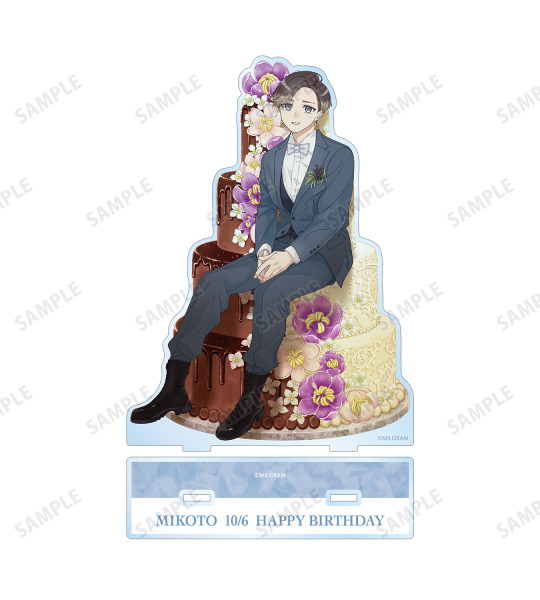
both his prisoner number and birth date are divisible by 3 but that's a bit of a reach lol
4. These flashes in Double

Why 3 silhouettes? Why is one cut off? Could be for aesthetics, could be a clue.

3 eyes = 3 points of view? Mild stretch, but the art of Milgram strikes me as very very intentional. The repeated vertical "stacking" of the lines in Deep Cover, Backdraft, and these eyes remind me of the concept of structural/tertiary dissociation, but again a bit of a reach
4. His uniform

Would almost rank this above Double's visuals. Sure, nearly every prisoner has three vertical straps across the torso, but Mikoto has 3 horizontal straps across his waist and 3 on his wrists (worth noting that the third wrist strap is broken on the Double album cover, which matches the breakage in Deep Cover's MV). 3 stacked lines again. A pattern is a pattern I suppose.
5. A) how the fuck did he know to do this when Mikoto and John had no clue what was happening to them, B) we never see him with his hair like this after MeMe. He disappeared, like Mikoto is implied to be trying to do in Neoplasm. Presumably, he split and/or stopped fronting, resulting in the theoretical "other" two taking over.

6. This frame in Under: MEOWWWWWW BIIIIIG STRETCH!! He's holding up 3 fingers lol (also emphasizing the wrist straps). I'm reaching the way he reaches for his face under stress but it's Something

Some other things that are almost too minor to consider but I thought about them anyway because this project has driven me insane:
-repeated use of red-green-blue-specific coloring in both MeMe and Double
-John is associated with Christ imagery (crown of thorns graphic in Double, "savior" complex etc.), which is closely linked with the "Holy Trinity." The 3 aspects are all considered equally God, and at the same time, equally their own being. Never understood that until I understood plurality, even though we aren't religious anymore.
-3 prevalent major arcana - the Fool, the Hanged Man, and the Devil - in MeMe; followed up by Death at the end (drastic change).
- 9/3 = 3 (could be a coincidence). Also his bangs are divided into three parts (big stretch)
In conclusion either this all means absolutely nothing or I'm about to boost my "theory maker" credibility tenfold in t3 lmao only time will tell
#long post#mikoto milgram#mikotoposting#midokoto#milgram theory#fucking gravity falls secret twin vibes all over again#i didn't believe that theory lmao#did this for funsies but yeah sorry i am insane about kayanosys it will happen again#trikoto theory#realistic not bc two alters is unrealistic#but bc it's realistic that yamanaka would hint at it This Many Times and deliver
55 notes
·
View notes
Text
"Ah, ahhh!! Because, I did it for your sake...! Because you would break apart!!"

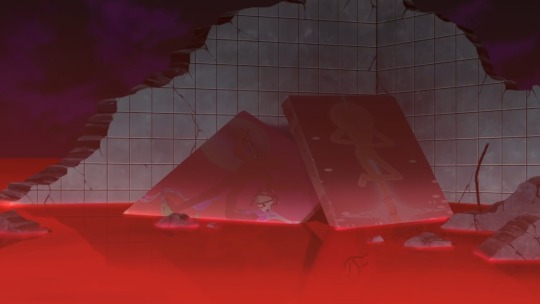
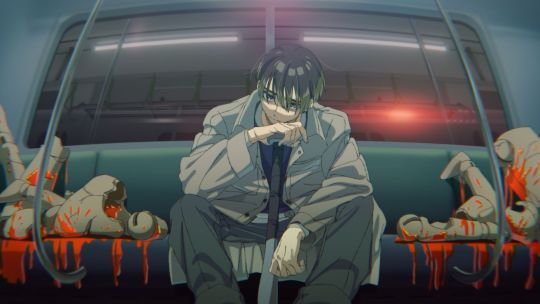
mannequins already broken apart... different mannequins representing mikoto and potentially other alters. thumbnail mikoto and his weapon have no blood on them.
alters cannot die, but they can split up or go dormant when faced with stress they can't handle.
orekoto has said time and time again that his main and only motive is protecting our host mikoto. if he's been around for a long time, i wonder if he's failed before to protect other alters, and is terrified of it happening again? maybe those mannequins next to him aren't victims, but past headmates who broke apart.
#milgram#mikoto kayano#im not a mikoto main btw im probably missing things. just quick thumbnail thoughts#im def projecting a lil but thats just my thoughts ^_^#fyi alters can go dormant without stress. stress is just one of many reasons an alter might do so#he's lost headmates before and he wont let it happen again :D
204 notes
·
View notes
Text
MeMe and Control over One's Own Destiny
Alright I've been holding off on talking about Mikoto until Double releases, but I saw he was on a train and my brain went Silly. Don't you understand how crazy the symbolism is?! (<- Mentally unwell)
So now I have to talk about how MeMe handles the concept of destiny and the control the alters have on the system's future, because it's honestly so interesting to me.
CW Murder
Disclaimer: I'm not an expert on DID, feel free to correct me if I get anything wrong
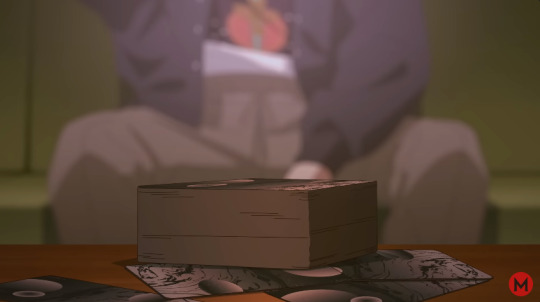

The first big connection between MeMe and the idea of destiny is obviously the recurring theme of tarot cards. These are used for divination, meaning the practice of trying to learn about the future through supernatural means. In other words, they're deeply tied to the concept of destiny, of future events that will come to affect us, and the ways we may influence it. What's important to take away here is that, regardless of whether or not you believe in it, reading tarot cards is a way for people to try to understand their future so they can take try to take control of it.
Once you make this little connection, a lot of the imagery in MeMe starts to get interesting. To give you an example, one of the opening shots is of a bunch of tarot cards all scattered in water.

So, their future is scattered, it's uncertain, it's messy, etc. You get the idea, I don't think I need to elaborate on why Mikoto's life is a bit of a mess.
However, I think there are two scenes which are particularly interesting in this regard. When Aokoto (host) draws a blank card in the first chorus, and when he gathers the cards in the deck at the start of the third chorus.

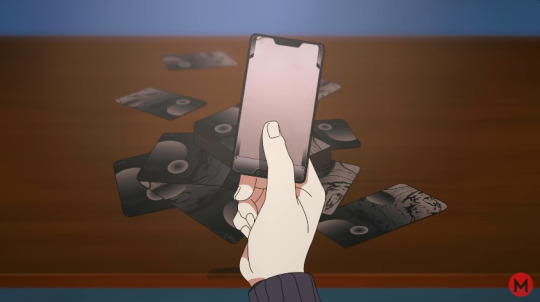

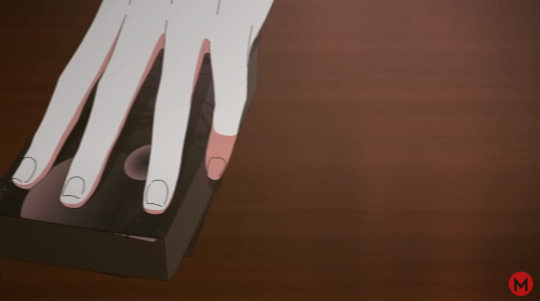
So first, we can be sure this is Aokoto because the lyrics not only use 'boku', but also express confusion at the situation, which only really fits the host.
Why am I [boku] here? It must be a mistake? Take a good look at me [boku], until you find me The truth will come to reveal itself I won't forgive you if this is happening to me even though I'm right
Why am I [boku] here? It must be a mistake? Take a good look at me [boku], until you find me
(Note: If there is no clarification on which pronoun is used when I put lyrics here, it's because the Japanese doesn't actually use any pronouns)
What's happening here? As stated, the tarot cards are a representation of destiny and their future. By drawing a tarot card, Aokoto is trying to understand his situation and destiny better. And by stacking the deck up neatly, he's trying to take control of his destiny, of his future. The desire to be free and be able to control his life is a very important part of Aokoto's character:
(T1) Q14: What will you be doing in 10 years? M (Ao): I'd like to work independently and make my own design company. That way I'm free to do what I want.
(T1) Q8: What are your reasons for wanting to work for your current job? M (Ao): I work at an advertising company that's at the top of the business world, you know? Just being able to get to that position is something to be proud of. I worked really hard to get hired there, too.
Aokoto places high value on the work he's done, because that shows how committed he is to having control over his life and his job.
(T1) Q12: How do you get to work? M (Ao): I ride a road bike. It's a hobby of mine, and it's good to exercise too. I don't need to worry about missing the train, but that can either be a good or bad thing.
I've seen this answer interpreted a few different ways, but personally I believe what Aokoto's implying is that the freedom of not having to rely on the train is both good and bad. Essentially, he doesn't have to stress about missing it, but there's also no guarantee that he'll get to work in time without the reliability of the train. However, he still prefers the bike, because it gives him more freedom.
... Foreshadowing is a narrative device-
There's also the matter of the tarot spreads which appear in that "blank card" scene. There are two distinct ones:


Now, the whole mess is too complicated to get into here (and I actually am holding off from analysis until we get extra context from Double for that reason), but I believe one of these spreads belongs to Aokoto, and the other belongs to Midokoto (Secret Third gatekeeper alter). Which is which doesn't matter, because the card I want to focus on is the card in the "Hopes and Fears" position (EXTREMELY long story), which is I - The Magician (upright) in both of them. The Magician represents (among a fuckton of other things because tarot cards are frustratingly ambiguous by design) power, potential, basically the ability to achieve your goals. Thus, in the "Hopes and Fears" position, it would mean Aokoto wants to be able to control his life and fulfill his potential, and is afraid he might not be able to.
There is also the "Present" or "Self" card being the reversed XII - The Hanged Man. The Hanged Man upright represents (among other things) patience, the hope that as long as everything continues the same, things will turn out okay. Thus, reversed, it could be read as implying the querent is trying their best to change their situation, but are failing at it.
And this is where we get to the second part of the scenes I pointed out before. Because when Aokoto draws a card by itself, it's a blank card. In other words, no matter how much he wants to, Aokoto doesn't have full control of his future. I mean, obviously, right? He himself can't control his destiny when the other alters are also doing pretty impactful stuff. Depending on what theories you subscribe to, he may have ended up in Milgram without even murdering anyone, which is what I believe.
The same can be seen when he tries to put the deck back together. You might notice the deck there is actually thinner than the other time we see it.


He tries to "fix" or "arrange" his future, but he's "playing with half a deck", he's only half in control of his future. In this metaphor, the other alter(s) would have the rest of the deck, would control the rest of the system's destiny. Does that make sense?
Which gets us to the other alter who does tarot reading.

Notice the red mannequin there? The way 0 - The Fool's pouch of food is now a skull? And you can see this alter, heavily implied to be Orekoto, reads a Celtic cross spread with the Fool in the "querent" or "present" position.
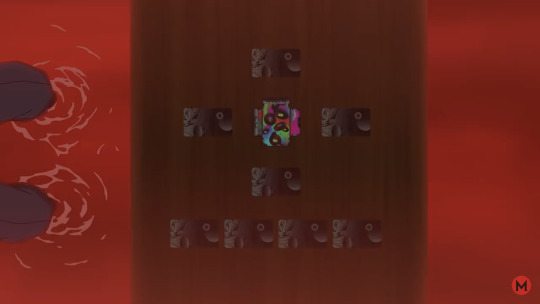
Thus, The Fool represents Orekoto, and he too desires control over their future. That's why he's reading the spread, the same way Aokoto previously tried to draw a card to check his future. And I think it's pretty safe to say Orekoto must have killed or attacked at least one person, which is his way of trying to secure a better future for the system. Protector alter and all that.
[Timelines] Mikoto (Ao): Can you hear me talking like this? If you can hear me, then answer me. Why are you doing such horrible things? Hey. It's your fault things have become like this. ……Answer me!! Mikoto (Ore): Ah, ahhh!! Because, I did it for my/your (Boku's) sake…! Because I/you (Boku-ga) would break apart!!
(Translation by Maristelina)
Plus all the other reasons to believe that.
That spread is a bit odd for many reasons, but one thing we can pretty much be sure of is Orekoto's "Hopes and Fears" are represented by VII - The Chariot.
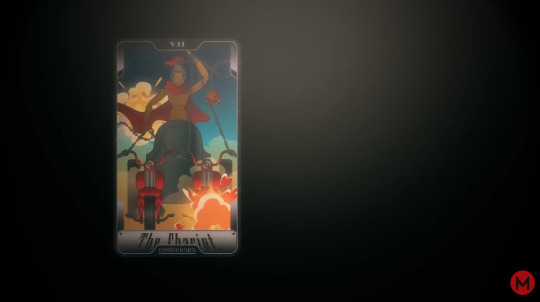
The Chariot (among other things) represents strength of will and control, basically think of it as a more forceful version of The Magician. Thus, Orekoto also hopes he can take control of their life, though he does it through force, and he fears he might be getting too forceful.
If I could laugh, if I could go back I'd play dead even though I'm alive right? If I could end, if I could stop How long would this dream go on?
Assuming it is Orekoto singing here (no pronouns so), it seems he doesn't want to kill, but sees himself cornered, like he has to kill. If he could stop, he'd "go back and play dead even while alive", he wouldn't kill anymore. But when he feels "boku will fall apart", he tries to save him through any means he can, which is likely murder. The exact reasons are as of yet unknown (someone stalking them, stress, could be a lot of things), but that's the idea.
However, you tarot enthusiast might notice a few interesting differences between this Chariot card and the actual Chariot card. This is important, because the meaning of these cards comes from the images, so when the image differs (apart from stylistic choices obvs), the meaning differs with it.

First important difference: the real Chariot has lions, MeMe's Chariot has bikes. This again relates bikes to the idea of freedom and one's own will.
Foreshadowing is-
Second; MeMe's Chariot has the protagonist swinging around a mace, which the real Chariot just has a wand. I frankly don't think this means anything other than MeMe's Chariot explicitly references murder rather than other, non-physical forms of strength and force.
Third, an important part of the real Chariot is that the man doesn't hold a leash on the lions, he controls them through force of will, apparently. Meanwhile, the mannequin in MeMe's version does hold chains to control the bikes, which again I believe simply implies a more forceful and direct version of the meaning. Orekoto doesn't trust his destiny to guide the system in the right direction as long as they're strong enough, he feels he needs to have more direct control.
And finally, the lions in the real Chariot are fine, but in MeMe's version, one of the bikes is fucking exploding.
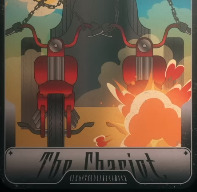
So what the hell is up with that? Well, let's keep in mind what I said before. Aokoto also wants control of his life. So I believe in a way these bikes represent Aokoto and Orekoto's actions. One of them Orekoto has direct control over (he controls his own actions, after all), while the other is getting hurt by Orekoto's control. Orekoto may want nothing more than to protect the system, but the way he does it is harmful to Aokoto and destroys the control he wants to have over their life. I mean, it landed them in Milgram (according to some interpretations), and it's not like Aokoto likes the murder.
(T1) Q6: Tell us what you hate. M (Ao): Staying up all night working / reptiles / violence
[Double Preview] Hey now, I [ore] saved you right? So why in the hell are you crying?
(I will use the preview as evidence, watch me)
Temporary CW for abusive relationships and rape (Mono Poisoner)
This idea of "love" that hurts the other is also implied by Mono Poisoner, their Trial 1 cover. Though to be clear, Orekoto is not anywhere near as awful as the protagonist of Mono Poisoner, since he isn't intentionally hurting the rest of the system, and obviously isn't actually abusing the other alter(s).
“She belongs completely, entirely to me!” Kissing, sleeping together, everything beyond that too No one can hope to cut this connection between us
After brandishing that poisonous desire to monopolize and having erased YOU completely, It seems like it can be easily embraced, the entirety of that heart “YOU best not get carried away!”
Taking out the really violent and abusive elements out, this does vaguely fit the idea I'm trying to get across.
Temporary CW over
Anyways, the point is that Orekoto wants control over their life, but is accidentally harming Aokoto by taking away his agency.
There is more symbolism of this ‘drive to control destiny’ in the moon which consistently appears throughout MeMe.
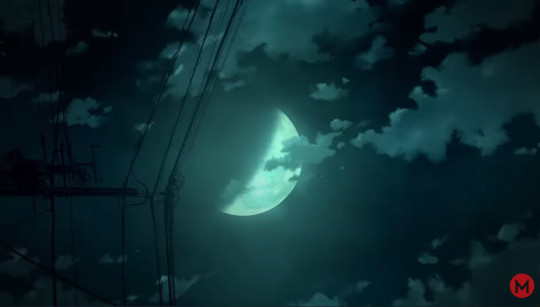

As you can see, it’s in the first quarter phase. This is halfway between the New Moon which represents the beginning of a journey and the Full Moon which represents the end or rebirth, and because of that, it can represent a difficult time where decisions must be made, a point where strength of will is necessary. This again fits both of Aokoto and Orekoto, since they’re both making important decisions for their future. Hence also why the moon is half and half, the future is being decided half by Aokoto, half by Orekoto.
Alternatively, you could read it as only Orekoto making decisions, with the other 'half' being "left in the dark" because Aokoto doesn't know what Ore's doing. That would explain why the moon only shows up in relation to Orekoto in the internal world and the murder scenes.
Heavy speculation incoming (more than before anyways)
But hold on a second. I said before the upright Hanged Man, the card on Mikoto's shirt through most of MeMe, is about patience and not doing anything to change their situation. This is somewhat contradictory to The Fool, which is all about new opportunities and taking new risks (long story), and is obviously contradictory to the reversed Hanged Man because that's how tarot cards work. Because of that, and everything else I've been saying, it feels like the upright Hanged Man doesn't really fit either Aokoto or Orekoto.
Which is why it's so convenient we have a third (plot-relevant, there may be more) alter who does want their life to continue as is, isn't it?
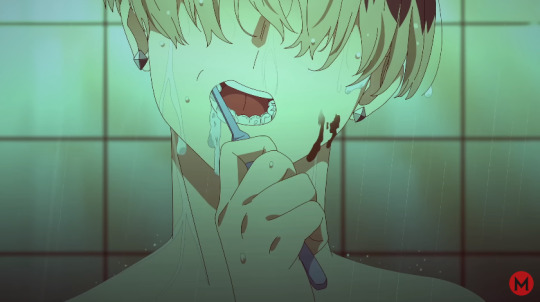
The minus energy that I swallowed Hugged me [boku] Maybe it's okay to try to keep on living Split in half, Make that heart beat
This scene is very clearly connected to the aftermath of a murder, and shows an alter that has accepted the "negative (minus) energy" of violence. However, the use of 'boku' rules out Orekoto as the singer. Thus, we have ourselves our favorite Secret Third Alter, Midokoto. And Midokoto says, filling in the blanks, that ‘maybe it’s okay to keep living [like this]’, as long as they ‘split in half’ to ‘make that heart beat.’
Before we continue, I have to address that yes, I believe Midokoto is represented by the upright Hanged Man, even though he’s the only alter who’s never seen wearing the shirt. Either his back is turned, he’s shirtless, or straight up has a completely different shirt. However, I actually think this makes perfect sense.
It’s widely accepted that if Midokoto exists, he’s likely a gatekeeper alter who co-fronts most of the time, meaning he’s still aware of everything that’s happening even while he isn’t controlling the body (<- simplified version, read more if you’re interested [alter roles] [co-fronting]). Therefore, he’s a constant in Mikoto’s life, and it makes sense for him to always be present in some way as long as any alter is on screen. He’s on the shirt when the other two are there, so when the shirt isn’t there, it’s because the ‘upright Hanged Man’ is the one controlling the body. Does that make sense?
I should note, Mikoto’s version of The Hanged Man includes a bunch of eyes on the background.
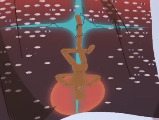
Which fits the idea of Midokoto overseeing everything in the others’ lives, and for the inverse in Aokoto’s case could also be interpreted as societal pressure, long story.
Yes, Midokoto's celtic cross spread has the reversed Hanged Man in the middle of The Wheel, but let’s just say that means ‘present’ rather than ‘querent.’ Yes, there’s a Fool portrait in the background of that one scene, I swear there’s an explanation but it’s too long to get into here.
Point is, he’s the one who wants their life to continue as is, and thus the one who fits the idea of ‘patience’ that The Hanged Man (upright) embodies.
But make no mistake. He still has The Magician as his “Hopes and Fears” in the spread which represents him, meaning he does yearn for some control and fears not having the means to achieve it.
However, I believe the type of control he’s looking for is different from the other two. See, while Aokoto wants freedom and control over his life in a more conventional way (good job, free movement, independence), and Orekoto wants control in a ‘no one will stop “I/you” from achieving what “I/you” want’ kinda way (aka safety), Midokoto wants control over the system, not the rest of their life. He wants to keep Aokoto and Orekoto ‘split in half’ because that’s how they can both live as they please, it ‘makes their heart beat.’
That’s why the moon that represents decision-making is split in half. That’s why there’s only two bikes in The Chariot card. That’s why Midokoto never bothers to read a single tarot card. Because the ones deciding where their life moves are Aokoto and Orekoto, all Midokoto does is keep things running smoothly. Though of course, this is all just my interpretation.
In fact, you can even tell based on what we believe each alter to do. Aokoto does the day-to-day work, making sure he has the opportunity to achieve his dream of working independently in the future. Orekoto deals with threats until the system as a whole is safe, which includes throwing away evidence so they don't get arrested. He does a dogshit job at it, yeah, but he's trying.
However, once they get into the apartment, when the external threats have been dealt with, the one who bathes to make sure Aokoto doesn't learn of Orekoto's actions, the one who keeps their lives metaphorically 'split in half', is Midokoto.
Heavy speculation kinda over
So, where were we? I said this was inspired by the Double thumbnail, didn’t I? Well, yes, even if I have very little to say about it in relation to this post. You could say I kinda, uh, went off the rails a bit (<- I am immensely unfunny)

As I said, he’s on a train. And with all the stuff I mentioned before about how bikes are associated with freedom for him and stuff, it makes the imagery of being stuck on a train with the victims (I assume that’s what the mannequins represent, I’ve seen other interpretations) a lot more interesting.
Think about it. When you get on a train, you made the decision to enter it, but you don’t have control over where it goes. And that’s what’s happening here: the alter on screen is in for the ride, and he feels there’s nothing he can do to alter the course. It’s like a railroad.
Aokoto didn’t get on this train. Obviously the scene is metaphorical (otherwise who left their mannequins in the goddamn public train), but we know Aokoto doesn’t use the train. However, he’s on it now, alongside Orekoto who is probably the one fronting here? I assume, given the red light in the background. In my mind it would make sense for the thumbnails to be Aokoto T1 -> Orekoto T2 -> Midokoto T3, but that doesn’t have to be the case.
What I’m trying to convey is the symbolism of the system being stuck in a set path, a set destiny, caused by a decision not made by Aokoto. And if Orekoto is really the one fronting or being represented here, he’s miserable because of the path his actions have landed him on.
If I could break it, if I could change Can I do it, I wonder from when I started to give up
He’s ‘given up’ because he’s accepted he’s ‘on the train’, his path is already set and he can’t change it (“if I could change”). Yes, give me that Orekoto angst!
Anyways, please keep in mind this is all my interpretation of the symbolism and all of this is extremely subjective, especially with how confusing Mikoto's entire story is. I hope you forgive my brainrot at seeing a guy take a train. Take care!
90 notes
·
View notes
Note
as someone with DID im just gonna say...
mikoto helped me figure that out and i kinda hate him for it. on another note im worried fuuta might be an alter of mine and i will kiss him - Fuuta kisser anon

#🩷🪽 ; confession#🩷 ; fuuta kisser anon#fuuta alters of milgramblr should be bffs#milgram fandom#milgramblr#fuuta kajiyama#mikoto kayano
12 notes
·
View notes
Text

this is how i imagine one of Mikoto's alters fronting for the first time around people (classmates, coworkers, whoever) playing out
#rambles#Milgram#Mikoto#(except itd stop at ''boku'')#tbh if we're trying to be ~realistic~ here. their system would prob be more than just Mikoto Orekoto and Greenkoto (idk what ppl call him)#like i aint never met another system that only consisted of 3 alters (who hadnt purposefully been working towards fusion)#that would be a lot to have to write and sort out though so i dont blame yamanaka and deco at all for keeping it at 3. hey better than 2!#(assuming trikoto theory is correct)#so this ''post'' is not about any of the 3. but the secret fourth/fifth/sixth/etc alter#idk i just think pronoun misuses would be funny in this context#alter trying to imitate Mikoto as best as they can then BAM ''watashi''/''ore''/''[insert any of the dozen pronouns]''#do you see my vision
72 notes
·
View notes
Text



reblog + like if using, simple aiura mikoto rentry gif
#plural community#didosdd#did system#plural system#sysblr#did alter#did#rentry#rentry decor#rentry gif#aiura mikoto#saiki k#the disastrous life of saiki k
28 notes
·
View notes
Text
A Who-Swung-It Mystery: The Case of the Switch-Hitter (1/3)
1 / 2 / 3
Despite the humorous title, I want to be serious for a second. I am not a licensed psychologist/psychiatrist/licensed social worker/etc., and I am certainly not an expert on dissociative identity disorder (DID). My knowledge of this disorder comes from the research I have done to try and understand it. I am trying to be as respectful as possible towards the subject matter, and I sincerely apologize if I show a lack of understanding and will do my best to correct it. I want to focus on switching, since we don't really have much information on Mikoto's childhood that led to him developing this disorder and I do not want to speculate. I only say childhood and not adulthood because the literature I found suggests that it is rather rare for this already rare disorder to form past the age of ten. Mikoto could be one of those special cases, but we'll have to wait and see.
Now, before you begin violently shaking me over the length of this post, just know that I am sorry about it. I want to argue that Mikoto’s DID is a red herring. Despite his claims otherwise, John did not directly kill anyone, Mikoto did. Through the voice dramas and the music videos, we get to see both Mikoto and John's individual perspectives and personalities. From what we've seen in MeMe and Double and then heard during John Doe and Neoplasm, I think I figured out what happened the night of the murder.
Fun fact before the post cut: in Japanese, the kanji for baseball are combine the kanji for field and ball (野球) and is read as ‘Kakyu’. The number nine in Japanese is read as ‘kyu’ or ‘ku’ and our baseball-loving prisoner, Mikoto, is prisoner number nine.
Okay, now you can begin violently shaking me.
Milgram's Very Own Dr. Jekyll and Mr. Hyde: Subverting the Evil Alter Trope
Robert Louis Stevenson's The Strange Case of Dr. Jekyll and Mr. Hyde is a tale that lives in infamy, and here in the West, it is synonymous with dual personalities. Published in 1886, the story is meant to be an allegory regarding good and evil. Pop culture osmosis usually has it right that Dr. Jekyll accidentally created Mr. Hyde in a lab accident, but here's the thing, it's more of a happy accident than a “Well, the risk I took was calculated but man, I’m bad at math,” one. Dr. Jekyll is a respectable, older gentleman who meant to erase his "shameful urges" (the story never explains what they are exactly, just that they go against the Victorian moral code) and accidentally created Mr. Hyde. As Mr. Hyde, Jekyll is a younger, shorter man whose only identifying feature is that everyone immediately hates him. That is not a joke. People who ran into Hyde can’t really describe him other than having the gut instinct to avoid him. But more importantly, I need you to know that Dr. Jekyll had spent most of the story voluntarily transforming himself into Mr. Hyde so he could give into those shameful urges and then used his wealth as Dr. Jekyll to sweep any trouble that arose back under the rug.
Besides being physically different, the main difference between Jekyll and Hyde is that Hyde lacks Jekyll's morals and inhibitions. Jekyll delights in the freedom he can experience as Hyde, until as Hyde, he beats a man to death with a cane. A few months before the murder, Jekyll had started to realize that he did not have as much control over Hyde as he previously thought and went two months without drinking the transformation tonic. As Jekyll puts it, in a moment of weakness, (yes, it reads like an allegory about substance abuse) Jekyll takes the tonic, transforms into Hyde, and since Hyde is pissed over being locked up for so long, he exercised his frustrations on a rich man's head.
Historically, the nineteenth century is when psychologists started arguing over the existence of multiple personalities, and the public back then was as fascinated with it as it is now. And I can't believe that we're nearing The Strange Case of Dr. Jekyll and Mr. Hyde's 150th anniversary, and the evil alternate personality trope is still going strong! I swear to you, it seems like DID is only ever brought up in conjunction with stories involving a murder(s), and the resolution is always, the evil alter committed it. I only know one example (Primal Fear (1996)) where the evil alter didn't do it, but that was because of the twist ending!
Besides wanting the novelty of the core having killed someone rather than the 'evil' alter, I think it would fit in with Milgram's dedication to emphasizing that each prisoner is an individual with their good points and bad. No one is 100% good, or bad, or anything else (Jackalope is 100% chaotic neutral, but he is a mythical creature, not a human, so shh). They have dominant traits that may influence their actions, but as in reality, things aren't black and white. It would make sense for Mikoto and John to reflect this. Mikoto is not 100% good and John is not 100% evil. They both have good and bad traits.
I think that the first trial shows it much better than the second, but Mikoto's main problem is how he constantly denies that anything is troubling him. Es calls him out on it explicitly during Neoplasm. Mikoto’s response is, “Usually, if you just laugh and pretend, things work out in the end,” explaining that the pretending helps him cope. It may not be the healthiest coping mechanism, but it is what he does. The most recent example of this not actually helping anyone is during Mikoto’s 2023 birthday timeline conversation. Mikoto questions himself to see if John really does exist and then he angrily blames John, only for John to front long enough to yell that he did it to save them. John disappears and Mikoto tells himself that that was useless, and that he’s tired and should stop thinking so hard about it. John has repeated quite a few times during Neoplasm and in that timeline conversation that he did it because Mikoto couldn’t handle it. The implication is that it is referring to the stress that built up and led to the murder. I agree with John that Mikoto’s decision to continue putting his head in the sand and to bottle up all his stress would have led to a breakdown. Everyone has a limit, and it is clear that Mikoto was rapidly approaching his. I don't disagree with that at all. What I disagree with is John's claim that he is solely responsible for the murder, because his existence does not make him purely evil and Mikoto's purely good. To think so is to play right into the black-and-white dichotomy of morality and play directly into Yamanaka's hands.
Despite his more sadistic tendencies, John does have some positive traits. We know he cares deeply for Mikoto and wants to protect him, even if his actions aren't acceptable. In Neoplasm, we’ve even heard John express some pride over being a college graduate, something Mikoto has previously downplayed when asked questions by Amane. We’ve seen in timeline conversations that Mikoto is capable of expressing annoyance and exasperation (with Fuuta) as well as anger (at John in the above timeline conversation). John can be cruel and aggressive, but he is active in asserting himself. Meanwhile, Mikoto is considerate to others to the point of his own detriment and is rather passive when it comes to conflict. Just because Mikoto seems to have more desirable character traits than John doesn’t make Mikoto incapable of committing a violent act.
Now, onto the murder, what could lead to Mikoto killing somebody?
"Communism was just a red herring." - Clue (1985)
I firmly believe that John is full of shit. Despite the number of destroyed mannequins, there is only one murder victim: the blond fellow we see at the beginning of MeMe. And just like in the cult classic, Clue (1985), I think the motive was blackmail.
Remember Mikoto's glitched line from the second voice trailer? "DESTROY EVERYTHING! EVERYTHING! EVERYTHING!" I don't know if this is just an accepted fan theory or if it had been confirmed, but it is believed that the lines from the second voice trailer happen before the murder takes place. If it had taken place after the murder occurred, then everything would most likely reference the evidence of the murder. But this takes place before the murder happened. Sure, it could be John's need for one of those rage rooms, but if I'm being honest, I think it was blackmail that could have gotten Mikoto fired from his job. Despite the amount of stress his current job causes him, Mikoto has stated over and over again that he worked very hard to get into the best company in the advertising business, and in his Trial Two interrogation questions, he has stated that he will not leave his current job because he believes that his efforts will eventually be rewarded. Mikoto is fine with being uncomfortable if he believes it will lead to future benefit (AKA, no pain, no gain).
From what I understand about Japan's work culture, getting fired puts a black stain on your record and makes it extremely difficult to find a new job. Getting fired by a top-tier advertising agency isn't just losing his dream job, but possibly destroying any chance of Mikoto gaining any opportunity or prestige for the rest of his career. All his hard work will be for naught. There are plenty of real-world instances where someone lost their job or lost their college acceptance because of poor behavior on the individual's part. If the blond victim had evidence of Mikoto acting badly, regardless of whether it was Mikoto or John fronting, Mikoto's boss could fire him, ruining his chances of ever being rewarded for his hard work. People have certainly killed for less in the real world.
Personally, I lean towards the blackmail being something John did, although this comes from Mikoto's line from Undercover: "Don't lie about me / what did I do?" If Mikoto cannot remember anything from when John fronts and he is aware of his forgetful spells, then not only would Mikoto question whether the blackmail had been doctored but also he'd wonder if there is a hint of truth to it. Remember Mikoto's words to Fuuta, "You're a uni student, right? You can't act like that once you start working properly," as if the angry behavior from Fuuta is only normal until a certain age. Perhaps Mikoto took part in some bad behavior in the past. More likely than not, it’s John in the blackmail. T1Q11 answer states, "Yes, I am [someone who takes others into consideration]. I'm a working adult. Communicating makes work easier." It's almost ironic how his boss constantly texting him and inconsideration causes Mikoto problems, and because he is the new guy and subordinate, Mikoto can't exactly tell his boss to fuck off.
His T1Q10 answer better lays out his beef with Fuuta's behavior: "I don't think I've ever gotten angry before. Isn't it kind of disgraceful to get angry?" Now, Mikoto is a very go-along-to-get-along kind of guy and Fuuta is not. He could be telling the truth that he has never gone into a blind rage (that Mikoto remembers), but to say he has never felt anger is most likely a lie.
Here is how I think the murder went down. At the beginning of MeMe, we see Mikoto waiting in a dark, secluded area near the train tracks. His hair is mostly covered by the beanie and we cannot make out his expression whatsoever, so there is no clue to tell us who is fronting between Mikoto and John. Mikoto does not appear to have a bat on his person or around him, and it seems like he is holding his phone. The blond victim could have just been a stranger walking by, but I think that he was an old friend of Mikoto's from high school or college and was supposed to meet with him. As peers who are supposed to be working adults, Mikoto is under the impression that whatever this is, they can just talk it out. This is all just one big misunderstanding.
Maybe the blond victim even brought the bat for an intimidation factor. Maybe Mikoto brought it just in case. I lean towards the former because you would notice misplacing your own baseball bat (they can get really expensive) is hard to not notice, and the whole thing is easier to deny if you don't even own the murder weapon in the first place. Whatever the case, the blond reveals his blackmail and demands payment or else it's getting sent to Mikoto's boss. Mikoto sees nothing but red, screams at his old friend to destroy all of the blackmail, take the bat, and then swings. The first blow hits the victim's lower back, just like how it hit Es in Undercover, and it is enough to render the victim's legs useless, forcing him to try and crawl away rather than run. Mikoto raises the bat well over his head and brings it down again, killing the victim.

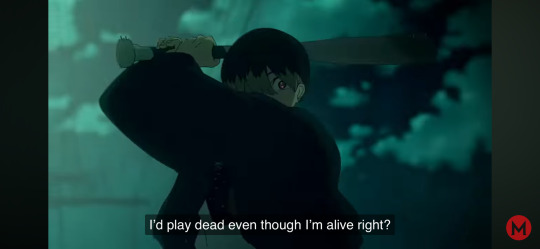
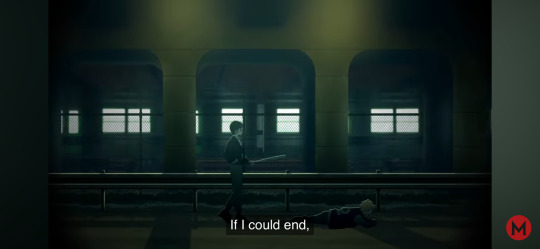

With no one around but his now deceased victim, the red haze lifts and Mikoto realizes what he just did, prompting the first trial glitched line, which is believed to take place after the murder, "My life... it wasn't supposed to be this way." The heartbreak is too much to bear. John takes over and is the one to bury the body, dispose of the evidence, and clean Mikoto up. When Mikoto wakes up the next day, he can disregard it as a bad dream: "All I did was dream / And that's what you found GUILTY?"
Pretty words, but empty ones, I know. Where's my proof? I'm glad you asked. :)
Switch-Hitting
Let's start out with the murder weapon: the baseball bat.
In baseball, a switch-hitter is someone who can bat left- and right-handed. Switch-hitters are prized by coaches, because batters have a higher chance of hitting the ball when they swing opposite of the pitcher; meaning a left-handed batter has a better chance of hitting a ball thrown by a right-handed pitcher than the right-handed batter against that same pitcher. There can be switch-pitchers (someone who can throw left- and right-handed), but because Mikoto's murder weapon seems to be the baseball bat, I'm going to focus on the way he swings the bat. As previously stated, during the third chorus of Undercover, we see Mikoto's silhouette bludgeon Es with a baseball bat.

Now, it has been a while since I've played baseball and softball, but I do still own a bat and I believe that that is a left-handed swing. A left-handed batter would have their left hand positioned above the right hand and the bat would have been held over their left shoulder. When they swing, they step in and turn towards their right to complete the swing. That is what Mikoto is doing in this picture. I tried to mimic the swing, but I am a right handed batter, so it feels awkward when I do it. Right-handed batters are more common that left-handed hitters, and in Double, we see Mikoto/John bat both ways, making him a switch-hitter. In the US, a switch-hitter has to pick one side to hit from during the time he is at bat, meaning that say he batted right, then swung and missed twice (two strikes, one more and he's out), he can’t switch to bat left. He can switch to bat left the next time he is up at bat, but he cannot switch positions once he steps up to the plate. I can’t find much on Japan’s rules about switch-hitting, but there’s a ton of articles about a high school player who kept switching positions for every pitch during the same at bat (pissing off the Americans in the comments section). Now, I can’t speak for professional baseball in Japan, but I guess switching positions during the same at bat is allowed at the level Mikoto played (high school). I do feel confident in stating that the Mikoto featured in Undercover has a left-handed swing. But Gimme, what does that have to do with switch-hitting? Switch-hitting involves batting both ways.
If you continue to closely watch the opening of MeMe, while Mikoto holds the bat in his left hand, but when he readies himself for the overhead swing, Mikoto has his right hand over his left, something a right-handed batter would do. I actually made a list of when we see Mikoto swing the bat, and it seems that when Mikoto swings the bat normally (like how he would in a game), he usually bats left-handed. I could only find one instance of Mikoto holding the bat right-handed as though he were up to bat.
Left-Handed Batting:
at 3:04 in Undercover
at 0:30 in MeMe
at 0:58 in Double
at 1:29 in Double



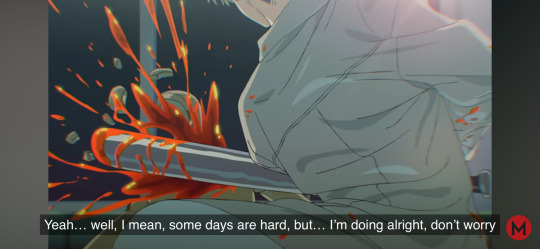
Right-Handed Batting:
at 1:26 in Double
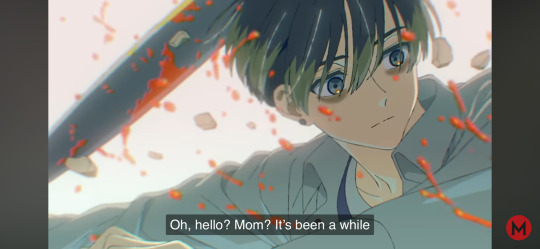
Buuuut, when we see Mikoto swing the bat abnormally, he uses his right hand to guide the swing as if he were batting right-handed. His right hand is above his left (which is normal positioning for a right-handed swing) when he does the overhead swing in MeMe at 0:37, and when he swings the bat one handed during Double, it is with his right-hand.
Your dominant hand isn't what determines your batting stance. Generally, it's a good indicator, but it's not set in stone thanks to cross-handedness. Cross-handedness is when you use your dominant hand for certain activities and your non-dominant hand for others. But if it matters, Mikoto is right-handed. Most of his actions in both songs involve his right-hand. If you watch MeMe, the only time Mikoto uses his left hand is to move the camera at the beginning and end of the song, and then to pick up the Death tarot card at the very end of the song. In Double, the only time he uses his left hand is when he swings the bat. Also, his shoulder bag is on his left shoulder in both MeMe and Double, and generally, purses and shoulder bags rests on your non-dominant side to give your dominant hand easy access.
Like I said, Mikoto being right-handed doesn't necessarily translate to him batting right-handed. Now, I'm no baseball expert, but I don't think his left-handed swings are all that good. They look 'jerky' to me. We don't see Mikoto complete a right-handed swing; we only see him hold the bat as if he is waiting for a pitch and the positioning seems natural. And there is something that I want to point out. You can train yourself to become a switch-hitter. I am not kidding when I say that switch-hitters are coveted. I think it would be in-character of Mikoto to naturally bat right-handed but try to teach himself how to bat left-handed so that he can become a switch-hitter. He is someone who knows what they want and creates a ten-step plan to get it, (see his "I wanted this job so I chose this art college with this degree"). He also believes in hard work being rewarded, so if he successfully trains himself to become a switch-hitter, his coach will reward him with more playing time (in this case, move him up the batting list). Mikoto is also self-effacing, so when he puts himself down, it needs to be questioned. Are his claims about not being good at baseball an example of his low self-esteem affects his perception of himself, or was he just plain bad because he was batting from the wrong side? He could just plain suck at baseball, but his abnormal, right-handed swings are smooth and controlled. It makes me think he bats right naturally, and that his left-handed swings are him practicing to get better at switch-hitting.
Unlike Mikoto, John is not patient. He would not bother with a swing he is not comfortable with. We saw that in John Doe as they are quick to taunt Es and lash out at them and Kotoko. John did not try to retreat and figure out a strategy to best Kotoko, an experienced fighter, he just went for it. I can only assume he wised up during his fight with Kotoko and that's why she couldn't knock him out a second time. This impulsive, fiery temper reappears in Neoplasm, when John mock Es for chaining Mikoto and for the name they gave him, and then as Es stalls during John's prodding of what will happen to Mikoto, John begins shouting at Es to answer him. I would probably split the two this way: while Mikoto is proactive with his willingness to think ahead and shortchange himself for the chance of being rewarded in the future, John is reactive and his impulsiveness leads to short-term thinking that can screw over Mikoto.
Here's Mikoto in Neoplasm: "I wonder if it's like... some kind of sleepwalking...? After all, I've been losing sleep more and more often recently... Man... It's really troublesome, isn't it?...Usually, if you just laugh and pretend, things work out in the end, right? I'm pretty good at that. Making things work out to the best of my abilities." At this point, he can no longer deny that nothing is wrong, and Mikoto is now forced to seriously consider just what is going on when he has these forgetful spells and falls asleep. Something is wrong, and he is trying to follow his usual protocol of smiling and quietly figuring out how to make things turn out for the best. Except it is not working in Milgram, triggering John's appearance in Neoplasm.
John is surprised by Es's acceptance of the situation, and even says, "I'd just think it's a lie someone came up with to get away with murder." As he and Es continue to talk, John asks Es why they think he was born and confirms that his role is to protect Mikoto from harm. Es is the one to bring up the murder, and suddenly, the chatty John is giving short, vague responses, reiterating that he is the murderer, not Mikoto. Here's some of it, "Yeah, it's me. I killed them off... They annoyed me [so I killed them]... Just someone [a stranger] who was walking around nearby... Can't remember [how many I killed]." When Es demands to know how John can be so calm, John changes the subject to find out what will happen to Mikoto. When Es cannot give him a satisfactory answer, John repeats again and again that Mikoto is innocent and that he, John, is at fault, so please forgive Mikoto. I think John would admit to every wrongdoing of Mikoto's if that meant Mikoto's burden would be lifted. It's why I don't trust him. Not only is his confession too vague to be considered admissible, but as Mikoto’s protector, he also has a reason to take the fall. John is not an evil alter, but he is taking advantage of the trope to get Mikoto the Innocent verdict. An Innocent verdict, in John’s mind, will erase most of Mikoto’s current stress. It is too short term, and relies to heavily on Mikoto’s habit of denial. If Mikoto is found Innocent, there is a chance that he may continue to pull his head out of the sand to figure out what is going on so he can learn how to manage or suppress it so his everyday life won't be impacted.
Oh, and one more thing before I end this first part.
That Wasn't Mikoto at the End of Neoplasm, which is why Double differs from MeMe.
John is playing up the idea that he is an evil alter to get Mikoto out of trouble, and the weird behavior shown by 'Mikoto' at the end of Neoplasm is just John attempting to manipulate us. Do you guys remember at the end of John Doe when Mikoto is back in control and is confused and then horrified as to why he’s hurting and why Es is now covered in bruises? From what I’ve read, that confusion is a common sign of personalities having been switched, and so is the memory loss he has experienced. Now compare that to the end of Neoplasm, when John ‘leaves’ and Mikoto comes back and immediately starts guessing what kind of dog Es owns? And how weird that is because Mikoto had started the interview clearly worried over what is going on with him when he is ‘asleep’? I don’t think Mikoto actually came back. I think that that’s John taking advantage of Es being startled by the bell and pretending to be Mikoto and trying to emphasize how harmless Mikoto. Mikoto is just a little guy. How can someone so friendly be a monster?
1 / 2 / 3
#mikoto kayano#john kayano#milgram project#milgram analysis#who-swung-it#do you like the whodunnit pun#I’m quite proud#long post#so long#I'm sorry#for the length#and the length alone#mikoto did it#you know it#i know it#the american people know it#but seriously#imagine if I'm right#surprise it wasn't the alter#it's the novelty of it#that makes me want it to happen#I do have proof#I just want to get this theory out right now#organizing the video evidence is a nightmare but it is there#just jumbled#in my drafts#taking up space
30 notes
·
View notes
Note
Any headcanons about Yuno, Muu, and Shidou being guilty in T1, for a total of 7 guilty prisoners? If it means anything, none of them have a higher guilty percent than Amane. (Yuno is 50.85%, Muu is 51.26%, Shidou is 50.96%, based on Pai's graph)
(I see what you're currently working on)
Haha, well I hoped you enjoyed a bit of comedy before I post some dramatic headcanons :3 Thank you for the request, this is a really interesting switch-up for the prison 👀👀👀 A majority guilty cast would carry a much darker tone, but allow for a few people to really shine.
Major guilty reactions:
Yuno: She’s just as bitter about her guilty verdict as she was in canon, becoming cold and isolated. She’s tired of people making judgements about things that are none of their business, and separates herself from everyone. There’s the subtle difference from canon because she actually agrees with this verdict, but still doesn’t think Es should be the one to give it out. Her video has more focus on Es/the audience, we see more people who may judge her (friends, family, etc). More stuffed animals, more crowds, all growing hostile. The video had more substantial hints towards her sadness at the way society looks down on people like her.
Muu: She becomes panicked and defensive with her judgment. She's flighty, startles easy, and lashes out in fear all the time. Now, she’s the one to consider ending everything – to her, the verdict essentially means “if it was really down to you or her, it shouldn’t have been her.” Her video really highlights that duality, turning both she and Rei into monsters battling for/with the hourglass. Her panicky attitude is reflected in it, feeling like everyone in the world must be out to get her now.
Shidou: He’s at peace with the verdict, and allows himself to fall into misery. He's thankful to be punished for all the guilt he’s been feeling. Kotoko’s attacks only plunge him deeper into despair. He feels helpless and once again can’t save people the way he wanted to. He’s disillusioned with his career and becomes pessimistic and bitter. He takes it out on Es, telling them there’s no way they can save anyone either. His video is full of unavoidable death in nature, like rotting food, changing seasons, and wilting flowers.
The attacks:
Since the guilty percentage order didn’t change, I’m going to say the attacks themselves happen exactly the same – it’s the aftermath that’s different. Whether it’s due to restraints or locked cells, Shidou isn’t able to offer aid. He has to sit back and talk the others through instruction: Haruka, Kazui, and Mikoto if he can get him to focus. They do their best, but they’ve never done anything like this before. Despite his calm attitude, Shidou isn’t good at explaining things he knows innately under pressure. Fuuta and Mahiru end up in a much worse state, since proper care was denied for so long. (I don’t think they’d kill anyone t2, but if they were willing to, she would have died here). Fuuta’s eye is gone for sure, and he has trouble getting around with his other injuries. Mahiru is barely scraping by, not allowed to leave her bed. Her video is glitchy and confusing due to the unhealed head injury and overall weakness.
Other character details:
Haruka grows even more confident than canon, seeing himself as Muu’s protector as well as the object of her affection. He helps her through her self-harming thoughts, feeling like a hero and a model son again. He threatens Es to vote her innocent, but with his newfound feeling of importance he threatens anothers’ safety, not his own (maybe Amane or Mahiru because they're smaller than him.)
Amane’s hatred for Shidou is actually dulled because he got a guilty verdict too. She believes he’s getting the punishment he deserves, and doesn't need to interfere. She's a little annoyed he's taking the punishment with open arms, though.
Fuuta’s line in Backdraft is just about Kotoko – “why is she innocent?” He feels less singled out among so many guilty prisoners, but he recognizes his parallels with her and it drives him crazy that they got different verdicts.
I won’t spoil anything for Kotoko’s stuff, but she’s a bit less harsh since she believes Es really is just like her, giving unattached, severe judgements.
Since he was able to help a lot in the attacks, both protecting Fuuta and offering care afterwards, Kazui really leans in the hero role. Whether he enjoyed being a cop before or not, he's consumed by that responsibility now. It gives him purpose and he really takes charge of everyone. He and Kotoko butt heads a lot now that he's speaking up more.
There are conflicted emotions between the innocent prisoners and patients – they know they’re not medically trained, but there’s still a bit of hostility that they didn’t do a good job. There’s a mix of feeling grateful for their aid and bitter it’s not perfect. The innocent ones get a confidence boost that they were able to be useful and protect others instead of hurt them, as well as get crushed by the guilty that they failed at offering great care.
I'll need more time to ruminate on it, but I wonder if given enough time, would the guilty prisoners band together and attack Kotoko back? It was hard for the canon four, but now they have the numbers...
#milgram#haruka sakurai#yuno kashiki#fuuta kajiyama#muu kusunoki#shidou kirisaki#mahiru shiina#kazui mukuhara#amane momose#kotoko yuzuhira#not tagging mikoto because i dont say much about him#sorry these hcs feel a bit scattered but i just wanted to put down the major things that caught my attention#it was fun picturing slightly altered t2 mvs!#i think that since so few innocent verdicts were given out it would make them feel even better about receiving one#so haruka and kazui would get even more of a confidence/ego boost#i dont think kazui would let the power get to his head but he does become a strong leader#and kotoko would be even more set in her ways while simultaneously being more patient and kind to es#i dont know if the seven Would join forces#its all kinda designed to keep them isolated - and yuno doesnt seem the type to get involved#muu is too much of a mess - so is mahiru - and shidous given up on everything#amane would be the one trying to get everyone to work together and i dont know if anyone would listen to a kid#much to think about....#anyway thank you for the request!! this was really fun to think about !#i call this the 'pretty much everyone gets worse' au asdfdsf#headcanon time milgram
35 notes
·
View notes
Text
es is genuinely one of the funniest characters ever. they’re a prison warden. they’re 15 years old. their boss is a talking rabbit jackalope. 70% of their prisoners are grown adults. no one else can hear their boss. they’re an amnesiac. they haven’t questioned any of this. they constantly get bullied by a 12 year old. they’re us. we’re them? they’re canonically non-binary. they’re having 30 different identity crises as we speak. i do not think they’re human.
#icarus speaks#posts that should probably go on the side blog#but. i need to propagandize my child#they’re from milgram by deco27 in case anyone’s wondering ^_^#u can find the entire series on youtube#smile#technically like. 72-75% of their prisoners are adults ig#depending on if you see mikoto having 1 or 2 known alters#but still. u get my point#scramble for life
38 notes
·
View notes
Text
and if i said mikoto t2 innocent. then what
#milgram#mikoto kayano#did osdd#like it was 100% an aggressive protector/persecutor#and you can tell that most of the people voting just think hes evil#the evil alter thing is such bad rep but it can be turned into “theyre trying to keep the main one safe” WHICH IS LITERALLY HOW SYSTEMS WORK#i like to believe that the reason his alter killed was for his own protection#and the amnesia gaps explain his ability to process trauma especially things like that#so theres no way he himself did that or would willingly unless someone else fronted and tried to get rid of whatever was hurting him#and in this case it was his job/office workers from his old job i like to believe??#ill write a better analysis someday but lime#unironically mikoto innocent#actually did
41 notes
·
View notes
Text
I know that Mikoto’s character carries so many themes of mental illness and stereotyped/stigmatized people and this post is not dissmissing that!! I just also feel like there’s another important metaphor he could represent. If we do take Orekoto at his word that he committed the full crime and Bokukoto is completely innocent, then this brings up an equally powerful morality debate when viewed under the lens of collective punishment.
Mikoto’s DID gives Milgram the chance to experiment on our views of collective punishment. When compared with the other 9 cases, Orekoto’s murders leans heavily unforgivable: “I killed a lot of people just because I was annoyed and I don’t feel remorse.” Thus, the debate becomes something new: should an innocent person be punished for another’s mistakes if there’s no way to separate them?
It works for the individual, but the metaphor covers comparisons about whole groups of people and communities. If it’s clear that one individual has done something wrong, but the only way to punish them involves hurting innocents, is it worth it? Orekoto assures us he won’t kill again, so it’s not a question of public safety, it’s just the question of assigning consequences. Is punishment worth the cost of that innocent person getting hurt? Is mercy worth a remorseless killer escaping without paying for it?
#milgram#mikoto kayano#i dont think orekoto is just 'evil scary alter' btw- i just think his murder is presented fairly unforgivable because of this exact dilemma#i think the fact he was doing it out of protection of others/self preservation (depending on how the system views it) is a very nuanced cas#but for the sake of this moral question its really interesting#bokukoto has always been painted wholly innocent and despite loving the theories that hes the true murderer i love this dilemma specificall#rose posts
23 notes
·
View notes
Text
No bc t1 Mikoto song is Host Angst t2 is Protector Angst pretty much all we need in t3 is Trauma Holder Angst
#milgram#john and mikoto are not exempt from trauma holder stuff esp. if mido does not have any canon appearance or confirmation#i just find it sosososo interesting how they've covered both revealed alters' perspectives so perfectly#mikotoposting#Mido oh Mido do I have some theories for your role oh yes I dooooo
28 notes
·
View notes
Text



theres no way these r the same alter right...
#shidouhateposting#< hes there#the reaction is way too different yeah ?#or maybe mikoto just reached his limit with shidous beautiful beautiful art....#im usually very doubtful of other alters in minigram but maybe this time theres something there
11 notes
·
View notes
Text
Started watching Milgram recently and honest to god this is the only time I’ve ever been ok with an evil alter trope. I’ve never seen the relationship between two alters in a system be so well written before.
#also the nature of Milgram and what it’s trying to say provides a space where a trope like that can actually be Interesting and makes Sense#but I’m way more focused on the relationship between the two of them and how John views Mikoto. like it’s really well done.#I see me and my headmates in so many of their interactions. it was rlly a breath of fresh air that I wasn’t expecting#Milgram#willows hot and sexy posts#I’m sure some systems in the fandom disagree with me and that’s totally ok!#I just personally really enjoyed seeing an alter actually care for their headmate.
15 notes
·
View notes